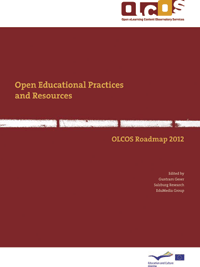by Guntram Geser and Sandra Schaffert
Open content in education and learning has increasingly gained attention in recent years. Its importance has been acknowledged by stakeholder organizations, and recent international initiatives are fostering the creation and sharing of such resources. The EU-project OLCOS observes the trends and implications of open content for learning and education, and offers guidelines and resources for teachers, learners, educational institutions and decision makers.
For many years now considerable investments have been made to equip educational institutions with computers, software programs, local area networks and Internet access. Recently, policy emphasis has switched from infrastructure and connectivity to content, services and practical usage. This switch necessitates a stronger commitment from the directors, managers and staff of educational institutions regarding educational innovation and organizational change.
The investments made in ICT-enabled teaching and learning have not yet brought about the profound changes in educational practices that would better align educational institutions with the requirements of the knowledge society. In addition, there is an obvious gap between current educational practices and those tools used so naturally by the younger generation. While blogs, Wikis and podcasts are used to communicate and to form communities of interest, these activities happen almost exclusively outside the classroom and thus outside the traditional learning environment.
Open Educational Resources
Open Educational Resources (OER) comprise content for teaching and learning, software-based tools and services, and licences that allow open development and reuse of content, tools and services. The importance of OER has been acknowledged by recent initiatives of the OECD's Centre for Educational Research and Innovation, UNESCO's International Institute for Educational Planning, and other national and international organizations that are stakeholders in the creation and sharing of such resources.
The importance of digital resources stems from the fact that these resources are fundamental to the knowledge society and economy. It is therefore essential that teachers and students become proficient with digital tools and services, and that they are aware of the various content licences. This proficiency is vital because within the digital realm content cannot be created, reused or shared without employing tools and services. Moreover, content licences are important because they define what the authors - who hold intellectual property rights (IPR) such as copyright - are willing to grant others who wish to benefit from the investment made in developing the content. There is an established understanding that easy access to educational resources is required to promote lifelong learning in people of all ages. The role of such access in reducing social inequalities, fostering social inclusion of migrants, and supporting education in developing countries is also often emphasized.
Additionally, when used in didactically sound ways, software-based tools, services and multimedia can allow innovative educational practices to emerge. For example, new educational opportunities may arise in a digitally enhanced collaboration between teachers and learners. Unfortunately, there exists a significant gap in teachers knowledge of how to use digital resources most effectively. We expect that this gap will be closed within communities of practice by teachers with the right professional attitude sharing their experience. Again, open access to resources is an important element in educational innovation, but it is not the only solution. The decisive factor is that open educational practices should be fostered by the appropriate institutional culture. Such a supportive environment should include easily accessible and shareable tools, services and content.
The OLCOS Project and Materials
Since early last year, the Open e-Learning Content Observatory Services (OLCOS) project has explored how Open Educational Resources (OER) can make a difference in teaching and learning. The project runs from January 2006 to December 2007 and is cofunded by the European Commission under the e-Learning Programme. The project consortium comprises the European Centre for Media Competence (Germany), the European Distance and E-Learning Network (EDEN Hungary), the FernUniversität in Hagen (Germany), the Mediamaisteri Group (Finland), the Open University of Catalonia (Spain), and the project coordinator Salzburg Research, EduMedia Group (Austria).
The project will employ a range of activities to promote Open Educational Resources. OLCOS has produced a roadmap that will help educational decision makers to familiarize themselves with OER and provide them with recommendations on how to foster its use and further development. This study can be downloaded for free (see link below). Besides these recommendations, the OLCOS project is also developing free online tutorials for practitioners. The objective of this online book is to support students and teachers in the creation, reuse and sharing of open educational resources.

Our initial findings show that OER can play an important role in teaching and learning. However, current educational practices will determine whether - and how - digital educational content, tools and services will be deployed and utilized. If the prevailing practice of teacher-centred knowledge transfer remains dominant, then OER will have little effect on innovation in teaching and learning. It is therefore also crucial to promote innovation and change in educational practices.
From a pedagogical perspective, the key aspects of ICT-supported lifelong learning and OER are that self-directed learning is emphasized, and that there is much potential for novel approaches of collaborative knowledge development. Such approaches are more likely to evolve in learning settings other than traditional forms of formal education, which still show few signs of abandoning the teacher-centred paradigm of education. However, in ICT supported lifelong learning, the role of coaches and communication among peers will need to be given much more attention and consideration. Those who have the greatest need for access to lifelong learning resources may not always be prepared for fully self-directed learning.
Links:
http://www.olcos.org
OLCOS Tutorials: http://www.wikieducator.org/Open_Educational_Content
EduMedia Group Salzburg Research: http://edumedia.salzburgresearch.at
Please contact:
Sandra Schaffert
Salzburg Research Forschungsgesellschaft, EduMedia Group, Austria
E-mail: sandra.schaffert![]() salzburgresearch.at
salzburgresearch.at










